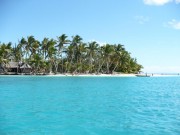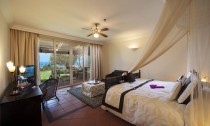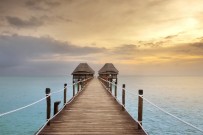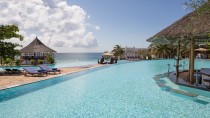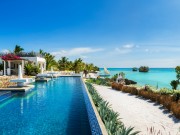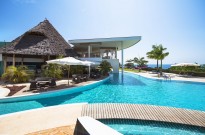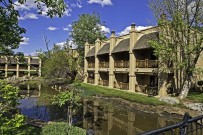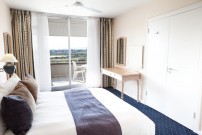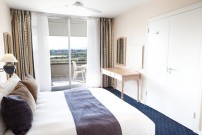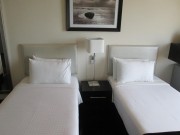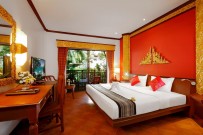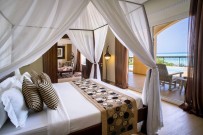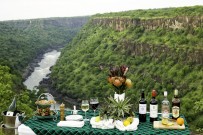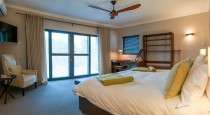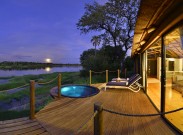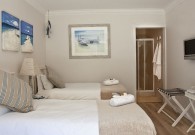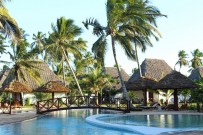Search results for 'white'
-
When nature and luxury come together to make you live a unique moment
Riake Resort & Villa, Mada...
ZAR780.00
ZAR700.00
Located in the North-East of Sainte-Marie (Madagascar), you will receive a warm welcome at the Riake Resort & Villa. You can find at the heart of an overwhelming natural beauty, overlooking a magnificent, white-sandy beach. The Riake Resort and Villa combines nature, comfort and luxury and was built in harmony with the local environment. At the Riake Resort & Villa, you will be able to enjoy the most pleasant climate on the island. A constant slight breeze maintains pleasant temperature all year long, and keeps the mosquitoes at bay. The Riake Resort & Villa opened in August 2011 and is the perfect place to relax, enjoy open air activities and immerse you in local traditions and customs. Learn MoreHome Away From Home
Diamonds La Gemma Dell 'Est - ...
ZAR3,300.00
ZAR3,190.00
WELCOME TO ZANZIBAR
Jambo! This is the Swahili greeting that you will hear on arrival when you are welcomed by the warm and inviting locals. Zanzibar is the name of an archipelago in the Indian Ocean just off the coast of East Africa. There are many small islands and two large ones: Unguja (the main island, sometimes informally referred to as 'Zanzibar'), and Pemba Island. As the number one beach location in East Africa, Zanzibar is a wonderful island, with classic tropical beaches, lush plantations, an incredible history and a fascinating culture. Apart from historic Stone Town, with its labyrinth of narrow streets, Zanzibar is known for its beautiful palm-fringed beaches and pristine coral reefs.
HISTORY
Zanzibar was inhabited by Portuguese navigators at the end of the 15th century. They were ousted 200 years later by the Omani Arabs and Zanzibar became a major centre for slave trading. The island became an Arab state and was an important centre of trade and politics in the region. European explorers, including Stanley and Livingstone, began their expeditions into the interior of Africa from Zanzibar in the late 1800’s. In 1964, the sultan and the government were overthrown in a revolution and in the same year, Zanzibar and Tanganyika combined to form the United Republic of Tanzania.
LANGUAGE
The indigenous language spoken throughout Zanzibar is Swahili (called Kiswahili locally). English is widely spoken and understood. Jambo Rafiki – Hello my friend!
CULTURE
Most of the people in Zanzibar are Muslim and all towns and villages on Zanzibar Island have mosques. Visitors to Zanzibar Town (Stone Town) will hear the evocative sound of the muezzins calling people to prayer from the minarets, especially for the evening session at sunset. There are also small populations of Christians and Hindus.
CLIMATE
Zanzibar is a few degrees south of the equator and enjoys a very tropical climate. The average daytime high is between 28°C and 32°C and the night-time lows are between 20°C and 25°C. Temperature wise – this island is an all-year-round winner. February is very hot and very humid (just leave your hair straightener at home!) and March to May are the wettest months.
CURRENCY
The local currency is Tanzania Shillings (TSH) but the currency cannot be bought outside of the country. Cash (US Dollars) and credit cards are accepted at hotels and at any Bureau de Change. We strongly recommend that you take USD cash in small denominations for incidental purchases, tips etc.
ELECTRICITY
220/230 V. square pin adapter (same plugs as UK). It is advisable to take along an international adaptor.
MALARIA
As Zanzibar is situated in a malaria zone, it is recommended that you consult your physician on the correct preventative medication required before you travel.
WHAT TO DO IN ZANZIBAR
Whether you spend your days lazing by the pool, sipping cocktails on the beach at sunset, diving in warm waters or enjoying a Dhow cruise around small islands, your Zanzibar holiday will be a memorable experience.
- Diving: With living reefs surrounding the islands, Zanzibar has excellent dive locations. There are plenty of places where the water temperature is warm, visibility is usually excellent, and currents are weak, all of which contributes to an ideal location for first time and novice divers. In addition to the warm and still waters full of colourful fish, there are many challenging dives as well. If you want to surf the current through a ravine, go for deep water, or search for wrecks, there are dive companies that can make it happen for you. Many of the larger resorts on the north and east coasts have professionally-run dive shops as well. Qualified divers must produce certification and a log book.
- Shopping: Whether you’re in the market for T-shirts, spices, kangas, furniture or hand sewn pillow covers, Stone Town is a great place for fun shopping and bargain hunting. You will find the inevitable ashtray carved out of a coconut shell, but there are enough Tinga-tinga paintings, woodcarvings and woven goods to keep almost everyone in the market for a tasteful souvenir.
- Stone Town: Declared a UNESCO World Heritage Site in 2001, Stone Town is a mishmash of cultures, languages and architecture. Over the centuries, Stone Town has grown from a small fishing village to a thriving town with an extraordinary history. Walking around Stone Town, you can see the influence of the different cultures that make up Zanzibar. Coral and stone houses show offimposing Zanzibar doors with brass studs as a defence against charging elephants and carvings with scriptures from the Quran. A tour of the town is highly recommended.
- Excursions: There are loads of excursions available to help you explore this unique island. It is wise to stick to a reputable operator and not be lured by beach boys and vendors who prey on tourists promising cheap prices. There are two excursions that are not to be missed in our opinion. A visit to a spice farm village on the Spice Tour will allow you to walk through the farm with your guide – touching, smelling and tasting different spices and fruits. It will give you an insight into local life and the opportunity to try some Swahili dishes, taste the fruits in season and try some spiced tea.
Setting sail on a traditional dhow will be one of the highlights of your trip. Safari Blue is a full day excursion which takes you out into Menai Bay – a haven of beautiful uninhabited islands where the waters are frequented by humpback and bottlenose dolphins. The anchor is dropped on a sandbank which makes for some spectacular snorkelling. Drinks are served throughout the day and lunch is a buffet of grilled fish, lobster, calamari and chicken. Make sure this one is on your itinerary.
WHAT TO PACK
- As a guide, the maximum weight for checked luggage is 20kg in economy class.
- Your hand-luggage should not weigh more than 6kg and needs to be small and compact
- Take along your best beach and casual wear, perfect for the day
- The dress-code for dinner is usually smart casual and gents may be required to wear long trousers
- Take an umbrella or rain poncho if travelling from October to January to March to June
- When in town, men & women should have their shoulders and knees covered. Bermuda shorts and a polo shirt are perfectly fine but halter-tops and miniskirts are insulting to locals
- Sunglasses and suntan lotion are a must
- Don’t forget any medication that you might need, and be sure to pack it in your hand luggage
- Chargers for all your devices (it’s a good idea to take along a few movies on a tablet or something similar as the English TV channels in your hotel may be limited)
- Swimming shoes and goggles
- Mosquito repellent
- A sun hat or cap
TRAVEL TIPS
- Pack a change of clothing in your hand luggage in case of baggage delays (and a spare cozzie so at least you can have a swim when you get to your resort)
- Clothing creases less if rolled in a sausage shape when packed – so roll, don’t fold
- No sharp objects are permitted in your hand luggage (yes, tweezers are sharp!)
- Travel insurance is a must. If you can’t afford it, you can’t afford to travel!
- Travelling with kids – please check that you have all the relevant documents including unabridged Birth Certificates.
- Put electronics, medication, toothbrushes and jewellery in your carry-on bag
- It’s often a good idea to let your bank or credit card company know that you’re going overseas
- Be patient, be flexible, be spontaneous and have the best time ever!
DID YOU KNOW:
- Due to its proximity to the Equator, Zanzibar is warm throughout the year and has equal days and nights (12-hours each)
- The shortest war ever recorded by man is the Anglo-Zanzibar War where the British bombarded the Beit al Hukum Palace and after 38 minutes, a ceasefire was called.
- Zanzibar is popularly known as the Spice Islands.
- Zanzibar has the largest number of carved doors in Africa
- Freddie Mercury, lead singer of the band Queen, was born in Zanzibar in 1946. His birth name was actually Farouk Bulsara.
Home Away From Home
Melia Zanzibar - 7 Nights
ZAR3,800.00
ZAR3,517.00
WELCOME TO ZANZIBAR
Jambo! This is the Swahili greeting that you will hear on arrival when you are welcomed by the warm and inviting locals. Zanzibar is the name of an archipelago in the Indian Ocean just off the coast of East Africa. There are many small islands and two large ones: Unguja (the main island, sometimes informally referred to as 'Zanzibar'), and Pemba Island. As the number one beach location in East Africa, Zanzibar is a wonderful island, with classic tropical beaches, lush plantations, an incredible history and a fascinating culture. Apart from historic Stone Town, with its labyrinth of narrow streets, Zanzibar is known for its beautiful palm-fringed beaches and pristine coral reefs.
HISTORY
Zanzibar was inhabited by Portuguese navigators at the end of the 15th century. They were ousted 200 years later by the Omani Arabs and Zanzibar became a major centre for slave trading. The island became an Arab state and was an important centre of trade and politics in the region. European explorers, including Stanley and Livingstone, began their expeditions into the interior of Africa from Zanzibar in the late 1800’s. In 1964, the sultan and the government were overthrown in a revolution and in the same year, Zanzibar and Tanganyika combined to form the United Republic of Tanzania.
LANGUAGE
The indigenous language spoken throughout Zanzibar is Swahili (called Kiswahili locally). English is widely spoken and understood. Jambo Rafiki – Hello my friend!
CULTURE
Most of the people in Zanzibar are Muslim and all towns and villages on Zanzibar Island have mosques. Visitors to Zanzibar Town (Stone Town) will hear the evocative sound of the muezzins calling people to prayer from the minarets, especially for the evening session at sunset. There are also small populations of Christians and Hindus.
CLIMATE
Zanzibar is a few degrees south of the equator and enjoys a very tropical climate. The average daytime high is between 28°C and 32°C and the night-time lows are between 20°C and 25°C. Temperature wise – this island is an all-year-round winner. February is very hot and very humid (just leave your hair straightener at home!) and March to May are the wettest months.
CURRENCY
The local currency is Tanzania Shillings (TSH) but the currency cannot be bought outside of the country. Cash (US Dollars) and credit cards are accepted at hotels and at any Bureau de Change. We strongly recommend that you take USD cash in small denominations for incidental purchases, tips etc.
ELECTRICITY
220/230 V. square pin adapter (same plugs as UK). It is advisable to take along an international adaptor.
MALARIA
As Zanzibar is situated in a malaria zone, it is recommended that you consult your physician on the correct preventative medication required before you travel.
WHAT TO DO IN ZANZIBAR
Whether you spend your days lazing by the pool, sipping cocktails on the beach at sunset, diving in warm waters or enjoying a Dhow cruise around small islands, your Zanzibar holiday will be a memorable experience.
- Diving: With living reefs surrounding the islands, Zanzibar has excellent dive locations. There are plenty of places where the water temperature is warm, visibility is usually excellent, and currents are weak, all of which contributes to an ideal location for first time and novice divers. In addition to the warm and still waters full of colourful fish, there are many challenging dives as well. If you want to surf the current through a ravine, go for deep water, or search for wrecks, there are dive companies that can make it happen for you. Many of the larger resorts on the north and east coasts have professionally-run dive shops as well. Qualified divers must produce certification and a log book.
- Shopping: Whether you’re in the market for T-shirts, spices, kangas, furniture or hand sewn pillow covers, Stone Town is a great place for fun shopping and bargain hunting. You will find the inevitable ashtray carved out of a coconut shell, but there are enough Tinga-tinga paintings, woodcarvings and woven goods to keep almost everyone in the market for a tasteful souvenir.
- Stone Town: Declared a UNESCO World Heritage Site in 2001, Stone Town is a mishmash of cultures, languages and architecture. Over the centuries, Stone Town has grown from a small fishing village to a thriving town with an extraordinary history. Walking around Stone Town, you can see the influence of the different cultures that make up Zanzibar. Coral and stone houses show offimposing Zanzibar doors with brass studs as a defence against charging elephants and carvings with scriptures from the Quran. A tour of the town is highly recommended.
- Excursions: There are loads of excursions available to help you explore this unique island. It is wise to stick to a reputable operator and not be lured by beach boys and vendors who prey on tourists promising cheap prices. There are two excursions that are not to be missed in our opinion. A visit to a spice farm village on the Spice Tour will allow you to walk through the farm with your guide – touching, smelling and tasting different spices and fruits. It will give you an insight into local life and the opportunity to try some Swahili dishes, taste the fruits in season and try some spiced tea.
Setting sail on a traditional dhow will be one of the highlights of your trip. Safari Blue is a full day excursion which takes you out into Menai Bay – a haven of beautiful uninhabited islands where the waters are frequented by humpback and bottlenose dolphins. The anchor is dropped on a sandbank which makes for some spectacular snorkelling. Drinks are served throughout the day and lunch is a buffet of grilled fish, lobster, calamari and chicken. Make sure this one is on your itinerary.
WHAT TO PACK
- As a guide, the maximum weight for checked luggage is 20kg in economy class.
- Your hand-luggage should not weigh more than 6kg and needs to be small and compact
- Take along your best beach and casual wear, perfect for the day
- The dress-code for dinner is usually smart casual and gents may be required to wear long trousers
- Take an umbrella or rain poncho if travelling from October to January to March to June
- When in town, men & women should have their shoulders and knees covered. Bermuda shorts and a polo shirt are perfectly fine but halter-tops and miniskirts are insulting to locals
- Sunglasses and suntan lotion are a must
- Don’t forget any medication that you might need, and be sure to pack it in your hand luggage
- Chargers for all your devices (it’s a good idea to take along a few movies on a tablet or something similar as the English TV channels in your hotel may be limited)
- Swimming shoes and goggles
- Mosquito repellent
- A sun hat or cap
TRAVEL TIPS
- Pack a change of clothing in your hand luggage in case of baggage delays (and a spare cozzie so at least you can have a swim when you get to your resort)
- Clothing creases less if rolled in a sausage shape when packed – so roll, don’t fold
- No sharp objects are permitted in your hand luggage (yes, tweezers are sharp!)
- Travel insurance is a must. If you can’t afford it, you can’t afford to travel!
- Travelling with kids – please check that you have all the relevant documents including unabridged Birth Certificates.
- Put electronics, medication, toothbrushes and jewellery in your carry-on bag
- It’s often a good idea to let your bank or credit card company know that you’re going overseas
- Be patient, be flexible, be spontaneous and have the best time ever!
DID YOU KNOW:
- Due to its proximity to the Equator, Zanzibar is warm throughout the year and has equal days and nights (12-hours each)
- The shortest war ever recorded by man is the Anglo-Zanzibar War where the British bombarded the Beit al Hukum Palace and after 38 minutes, a ceasefire was called.
- Zanzibar is popularly known as the Spice Islands.
- Zanzibar has the largest number of carved doors in Africa
- Freddie Mercury, lead singer of the band Queen, was born in Zanzibar in 1946. His birth name was actually Farouk Bulsara.
Home Away From Home
The Royal Zanzibar Beach Resor...
ZAR4,500.00
ZAR4,340.00
WELCOME TO ZANZIBAR
Jambo! This is the Swahili greeting that you will hear on arrival when you are welcomed by the warm and inviting locals. Zanzibar is the name of an archipelago in the Indian Ocean just off the coast of East Africa. There are many small islands and two large ones: Unguja (the main island, sometimes informally referred to as 'Zanzibar'), and Pemba Island. As the number one beach location in East Africa, Zanzibar is a wonderful island, with classic tropical beaches, lush plantations, an incredible history and a fascinating culture. Apart from historic Stone Town, with its labyrinth of narrow streets, Zanzibar is known for its beautiful palm-fringed beaches and pristine coral reefs.
HISTORY
Zanzibar was inhabited by Portuguese navigators at the end of the 15th century. They were ousted 200 years later by the Omani Arabs and Zanzibar became a major centre for slave trading. The island became an Arab state and was an important centre of trade and politics in the region. European explorers, including Stanley and Livingstone, began their expeditions into the interior of Africa from Zanzibar in the late 1800’s. In 1964, the sultan and the government were overthrown in a revolution and in the same year, Zanzibar and Tanganyika combined to form the United Republic of Tanzania.
LANGUAGE
The indigenous language spoken throughout Zanzibar is Swahili (called Kiswahili locally). English is widely spoken and understood. Jambo Rafiki – Hello my friend!
CULTURE
Most of the people in Zanzibar are Muslim and all towns and villages on Zanzibar Island have mosques. Visitors to Zanzibar Town (Stone Town) will hear the evocative sound of the muezzins calling people to prayer from the minarets, especially for the evening session at sunset. There are also small populations of Christians and Hindus.
CLIMATE
Zanzibar is a few degrees south of the equator and enjoys a very tropical climate. The average daytime high is between 28°C and 32°C and the night-time lows are between 20°C and 25°C. Temperature wise – this island is an all-year-round winner. February is very hot and very humid (just leave your hair straightener at home!) and March to May are the wettest months.
CURRENCY
The local currency is Tanzania Shillings (TSH) but the currency cannot be bought outside of the country. Cash (US Dollars) and credit cards are accepted at hotels and at any Bureau de Change. We strongly recommend that you take USD cash in small denominations for incidental purchases, tips etc.
ELECTRICITY
220/230 V. square pin adapter (same plugs as UK). It is advisable to take along an international adaptor.
MALARIA
As Zanzibar is situated in a malaria zone, it is recommended that you consult your physician on the correct preventative medication required before you travel.
WHAT TO DO IN ZANZIBAR
Whether you spend your days lazing by the pool, sipping cocktails on the beach at sunset, diving in warm waters or enjoying a Dhow cruise around small islands, your Zanzibar holiday will be a memorable experience.
- Diving: With living reefs surrounding the islands, Zanzibar has excellent dive locations. There are plenty of places where the water temperature is warm, visibility is usually excellent, and currents are weak, all of which contributes to an ideal location for first time and novice divers. In addition to the warm and still waters full of colourful fish, there are many challenging dives as well. If you want to surf the current through a ravine, go for deep water, or search for wrecks, there are dive companies that can make it happen for you. Many of the larger resorts on the north and east coasts have professionally-run dive shops as well. Qualified divers must produce certification and a log book.
- Shopping: Whether you’re in the market for T-shirts, spices, kangas, furniture or hand sewn pillow covers, Stone Town is a great place for fun shopping and bargain hunting. You will find the inevitable ashtray carved out of a coconut shell, but there are enough Tinga-tinga paintings, woodcarvings and woven goods to keep almost everyone in the market for a tasteful souvenir.
- Stone Town: Declared a UNESCO World Heritage Site in 2001, Stone Town is a mishmash of cultures, languages and architecture. Over the centuries, Stone Town has grown from a small fishing village to a thriving town with an extraordinary history. Walking around Stone Town, you can see the influence of the different cultures that make up Zanzibar. Coral and stone houses show offimposing Zanzibar doors with brass studs as a defence against charging elephants and carvings with scriptures from the Quran. A tour of the town is highly recommended.
- Excursions: There are loads of excursions available to help you explore this unique island. It is wise to stick to a reputable operator and not be lured by beach boys and vendors who prey on tourists promising cheap prices. There are two excursions that are not to be missed in our opinion. A visit to a spice farm village on the Spice Tour will allow you to walk through the farm with your guide – touching, smelling and tasting different spices and fruits. It will give you an insight into local life and the opportunity to try some Swahili dishes, taste the fruits in season and try some spiced tea.
Setting sail on a traditional dhow will be one of the highlights of your trip. Safari Blue is a full day excursion which takes you out into Menai Bay – a haven of beautiful uninhabited islands where the waters are frequented by humpback and bottlenose dolphins. The anchor is dropped on a sandbank which makes for some spectacular snorkelling. Drinks are served throughout the day and lunch is a buffet of grilled fish, lobster, calamari and chicken. Make sure this one is on your itinerary.
WHAT TO PACK
- As a guide, the maximum weight for checked luggage is 20kg in economy class.
- Your hand-luggage should not weigh more than 6kg and needs to be small and compact
- Take along your best beach and casual wear, perfect for the day
- The dress-code for dinner is usually smart casual and gents may be required to wear long trousers
- Take an umbrella or rain poncho if travelling from October to January to March to June
- When in town, men & women should have their shoulders and knees covered. Bermuda shorts and a polo shirt are perfectly fine but halter-tops and miniskirts are insulting to locals
- Sunglasses and suntan lotion are a must
- Don’t forget any medication that you might need, and be sure to pack it in your hand luggage
- Chargers for all your devices (it’s a good idea to take along a few movies on a tablet or something similar as the English TV channels in your hotel may be limited)
- Swimming shoes and goggles
- Mosquito repellent
- A sun hat or cap
TRAVEL TIPS
- Pack a change of clothing in your hand luggage in case of baggage delays (and a spare cozzie so at least you can have a swim when you get to your resort)
- Clothing creases less if rolled in a sausage shape when packed – so roll, don’t fold
- No sharp objects are permitted in your hand luggage (yes, tweezers are sharp!)
- Travel insurance is a must. If you can’t afford it, you can’t afford to travel!
- Travelling with kids – please check that you have all the relevant documents including unabridged Birth Certificates.
- Put electronics, medication, toothbrushes and jewellery in your carry-on bag
- It’s often a good idea to let your bank or credit card company know that you’re going overseas
- Be patient, be flexible, be spontaneous and have the best time ever!
DID YOU KNOW:
- Due to its proximity to the Equator, Zanzibar is warm throughout the year and has equal days and nights (12-hours each)
- The shortest war ever recorded by man is the Anglo-Zanzibar War where the British bombarded the Beit al Hukum Palace and after 38 minutes, a ceasefire was called.
- Zanzibar is popularly known as the Spice Islands.
- Zanzibar has the largest number of carved doors in Africa
- Freddie Mercury, lead singer of the band Queen, was born in Zanzibar in 1946. His birth name was actually Farouk Bulsara.
Home Away From Home
Constance Aiyana - 7 Nights
ZAR5,900.00
ZAR5,491.00
WELCOME TO ZANZIBAR
Jambo! This is the Swahili greeting that you will hear on arrival when you are welcomed by the warm and inviting locals. Zanzibar is the name of an archipelago in the Indian Ocean just off the coast of East Africa. There are many small islands and two large ones: Unguja (the main island, sometimes informally referred to as 'Zanzibar'), and Pemba Island. As the number one beach location in East Africa, Zanzibar is a wonderful island, with classic tropical beaches, lush plantations, an incredible history and a fascinating culture. Apart from historic Stone Town, with its labyrinth of narrow streets, Zanzibar is known for its beautiful palm-fringed beaches and pristine coral reefs.
HISTORY
Zanzibar was inhabited by Portuguese navigators at the end of the 15th century. They were ousted 200 years later by the Omani Arabs and Zanzibar became a major centre for slave trading. The island became an Arab state and was an important centre of trade and politics in the region. European explorers, including Stanley and Livingstone, began their expeditions into the interior of Africa from Zanzibar in the late 1800’s. In 1964, the sultan and the government were overthrown in a revolution and in the same year, Zanzibar and Tanganyika combined to form the United Republic of Tanzania.
LANGUAGE
The indigenous language spoken throughout Zanzibar is Swahili (called Kiswahili locally). English is widely spoken and understood. Jambo Rafiki – Hello my friend!
CULTURE
Most of the people in Zanzibar are Muslim and all towns and villages on Zanzibar Island have mosques. Visitors to Zanzibar Town (Stone Town) will hear the evocative sound of the muezzins calling people to prayer from the minarets, especially for the evening session at sunset. There are also small populations of Christians and Hindus.
CLIMATE
Zanzibar is a few degrees south of the equator and enjoys a very tropical climate. The average daytime high is between 28°C and 32°C and the night-time lows are between 20°C and 25°C. Temperature wise – this island is an all-year-round winner. February is very hot and very humid (just leave your hair straightener at home!) and March to May are the wettest months.
CURRENCY
The local currency is Tanzania Shillings (TSH) but the currency cannot be bought outside of the country. Cash (US Dollars) and credit cards are accepted at hotels and at any Bureau de Change. We strongly recommend that you take USD cash in small denominations for incidental purchases, tips etc.
ELECTRICITY
220/230 V. square pin adapter (same plugs as UK). It is advisable to take along an international adaptor.
MALARIA
As Zanzibar is situated in a malaria zone, it is recommended that you consult your physician on the correct preventative medication required before you travel.
WHAT TO DO IN ZANZIBAR
Whether you spend your days lazing by the pool, sipping cocktails on the beach at sunset, diving in warm waters or enjoying a Dhow cruise around small islands, your Zanzibar holiday will be a memorable experience.
- Diving: With living reefs surrounding the islands, Zanzibar has excellent dive locations. There are plenty of places where the water temperature is warm, visibility is usually excellent, and currents are weak, all of which contributes to an ideal location for first time and novice divers. In addition to the warm and still waters full of colourful fish, there are many challenging dives as well. If you want to surf the current through a ravine, go for deep water, or search for wrecks, there are dive companies that can make it happen for you. Many of the larger resorts on the north and east coasts have professionally-run dive shops as well. Qualified divers must produce certification and a log book.
- Shopping: Whether you’re in the market for T-shirts, spices, kangas, furniture or hand sewn pillow covers, Stone Town is a great place for fun shopping and bargain hunting. You will find the inevitable ashtray carved out of a coconut shell, but there are enough Tinga-tinga paintings, woodcarvings and woven goods to keep almost everyone in the market for a tasteful souvenir.
- Stone Town: Declared a UNESCO World Heritage Site in 2001, Stone Town is a mishmash of cultures, languages and architecture. Over the centuries, Stone Town has grown from a small fishing village to a thriving town with an extraordinary history. Walking around Stone Town, you can see the influence of the different cultures that make up Zanzibar. Coral and stone houses show offimposing Zanzibar doors with brass studs as a defence against charging elephants and carvings with scriptures from the Quran. A tour of the town is highly recommended.
- Excursions: There are loads of excursions available to help you explore this unique island. It is wise to stick to a reputable operator and not be lured by beach boys and vendors who prey on tourists promising cheap prices. There are two excursions that are not to be missed in our opinion. A visit to a spice farm village on the Spice Tour will allow you to walk through the farm with your guide – touching, smelling and tasting different spices and fruits. It will give you an insight into local life and the opportunity to try some Swahili dishes, taste the fruits in season and try some spiced tea.
Setting sail on a traditional dhow will be one of the highlights of your trip. Safari Blue is a full day excursion which takes you out into Menai Bay – a haven of beautiful uninhabited islands where the waters are frequented by humpback and bottlenose dolphins. The anchor is dropped on a sandbank which makes for some spectacular snorkelling. Drinks are served throughout the day and lunch is a buffet of grilled fish, lobster, calamari and chicken. Make sure this one is on your itinerary.
WHAT TO PACK
- As a guide, the maximum weight for checked luggage is 20kg in economy class.
- Your hand-luggage should not weigh more than 6kg and needs to be small and compact
- Take along your best beach and casual wear, perfect for the day
- The dress-code for dinner is usually smart casual and gents may be required to wear long trousers
- Take an umbrella or rain poncho if travelling from October to January to March to June
- When in town, men & women should have their shoulders and knees covered. Bermuda shorts and a polo shirt are perfectly fine but halter-tops and miniskirts are insulting to locals
- Sunglasses and suntan lotion are a must
- Don’t forget any medication that you might need, and be sure to pack it in your hand luggage
- Chargers for all your devices (it’s a good idea to take along a few movies on a tablet or something similar as the English TV channels in your hotel may be limited)
- Swimming shoes and goggles
- Mosquito repellent
- A sun hat or cap
TRAVEL TIPS
- Pack a change of clothing in your hand luggage in case of baggage delays (and a spare cozzie so at least you can have a swim when you get to your resort)
- Clothing creases less if rolled in a sausage shape when packed – so roll, don’t fold
- No sharp objects are permitted in your hand luggage (yes, tweezers are sharp!)
- Travel insurance is a must. If you can’t afford it, you can’t afford to travel!
- Travelling with kids – please check that you have all the relevant documents including unabridged Birth Certificates.
- Put electronics, medication, toothbrushes and jewellery in your carry-on bag
- It’s often a good idea to let your bank or credit card company know that you’re going overseas
- Be patient, be flexible, be spontaneous and have the best time ever!
DID YOU KNOW:
- Due to its proximity to the Equator, Zanzibar is warm throughout the year and has equal days and nights (12-hours each)
- The shortest war ever recorded by man is the Anglo-Zanzibar War where the British bombarded the Beit al Hukum Palace and after 38 minutes, a ceasefire was called.
- Zanzibar is popularly known as the Spice Islands.
- Zanzibar has the largest number of carved doors in Africa
- Freddie Mercury, lead singer of the band Queen, was born in Zanzibar in 1946. His birth name was actually Farouk Bulsara.
Home Away From Home
Diamonds Star Of The East - 7 ...
ZAR7,500.00
ZAR7,200.00
WELCOME TO ZANZIBAR
Jambo! This is the Swahili greeting that you will hear on arrival when you are welcomed by the warm and inviting locals. Zanzibar is the name of an archipelago in the Indian Ocean just off the coast of East Africa. There are many small islands and two large ones: Unguja (the main island, sometimes informally referred to as 'Zanzibar'), and Pemba Island. As the number one beach location in East Africa, Zanzibar is a wonderful island, with classic tropical beaches, lush plantations, an incredible history and a fascinating culture. Apart from historic Stone Town, with its labyrinth of narrow streets, Zanzibar is known for its beautiful palm-fringed beaches and pristine coral reefs.
HISTORY
Zanzibar was inhabited by Portuguese navigators at the end of the 15th century. They were ousted 200 years later by the Omani Arabs and Zanzibar became a major centre for slave trading. The island became an Arab state and was an important centre of trade and politics in the region. European explorers, including Stanley and Livingstone, began their expeditions into the interior of Africa from Zanzibar in the late 1800’s. In 1964, the sultan and the government were overthrown in a revolution and in the same year, Zanzibar and Tanganyika combined to form the United Republic of Tanzania.
LANGUAGE
The indigenous language spoken throughout Zanzibar is Swahili (called Kiswahili locally). English is widely spoken and understood. Jambo Rafiki – Hello my friend!
CULTURE
Most of the people in Zanzibar are Muslim and all towns and villages on Zanzibar Island have mosques. Visitors to Zanzibar Town (Stone Town) will hear the evocative sound of the muezzins calling people to prayer from the minarets, especially for the evening session at sunset. There are also small populations of Christians and Hindus.
CLIMATE
Zanzibar is a few degrees south of the equator and enjoys a very tropical climate. The average daytime high is between 28°C and 32°C and the night-time lows are between 20°C and 25°C. Temperature wise – this island is an all-year-round winner. February is very hot and very humid (just leave your hair straightener at home!) and March to May are the wettest months.
CURRENCY
The local currency is Tanzania Shillings (TSH) but the currency cannot be bought outside of the country. Cash (US Dollars) and credit cards are accepted at hotels and at any Bureau de Change. We strongly recommend that you take USD cash in small denominations for incidental purchases, tips etc.
ELECTRICITY
220/230 V. square pin adapter (same plugs as UK). It is advisable to take along an international adaptor.
MALARIA
As Zanzibar is situated in a malaria zone, it is recommended that you consult your physician on the correct preventative medication required before you travel.
WHAT TO DO IN ZANZIBAR
Whether you spend your days lazing by the pool, sipping cocktails on the beach at sunset, diving in warm waters or enjoying a Dhow cruise around small islands, your Zanzibar holiday will be a memorable experience.
- Diving: With living reefs surrounding the islands, Zanzibar has excellent dive locations. There are plenty of places where the water temperature is warm, visibility is usually excellent, and currents are weak, all of which contributes to an ideal location for first time and novice divers. In addition to the warm and still waters full of colourful fish, there are many challenging dives as well. If you want to surf the current through a ravine, go for deep water, or search for wrecks, there are dive companies that can make it happen for you. Many of the larger resorts on the north and east coasts have professionally-run dive shops as well. Qualified divers must produce certification and a log book.
- Shopping: Whether you’re in the market for T-shirts, spices, kangas, furniture or hand sewn pillow covers, Stone Town is a great place for fun shopping and bargain hunting. You will find the inevitable ashtray carved out of a coconut shell, but there are enough Tinga-tinga paintings, woodcarvings and woven goods to keep almost everyone in the market for a tasteful souvenir.
- Stone Town: Declared a UNESCO World Heritage Site in 2001, Stone Town is a mishmash of cultures, languages and architecture. Over the centuries, Stone Town has grown from a small fishing village to a thriving town with an extraordinary history. Walking around Stone Town, you can see the influence of the different cultures that make up Zanzibar. Coral and stone houses show offimposing Zanzibar doors with brass studs as a defence against charging elephants and carvings with scriptures from the Quran. A tour of the town is highly recommended.
- Excursions: There are loads of excursions available to help you explore this unique island. It is wise to stick to a reputable operator and not be lured by beach boys and vendors who prey on tourists promising cheap prices. There are two excursions that are not to be missed in our opinion. A visit to a spice farm village on the Spice Tour will allow you to walk through the farm with your guide – touching, smelling and tasting different spices and fruits. It will give you an insight into local life and the opportunity to try some Swahili dishes, taste the fruits in season and try some spiced tea.
Setting sail on a traditional dhow will be one of the highlights of your trip. Safari Blue is a full day excursion which takes you out into Menai Bay – a haven of beautiful uninhabited islands where the waters are frequented by humpback and bottlenose dolphins. The anchor is dropped on a sandbank which makes for some spectacular snorkelling. Drinks are served throughout the day and lunch is a buffet of grilled fish, lobster, calamari and chicken. Make sure this one is on your itinerary.
WHAT TO PACK
- As a guide, the maximum weight for checked luggage is 20kg in economy class.
- Your hand-luggage should not weigh more than 6kg and needs to be small and compact
- Take along your best beach and casual wear, perfect for the day
- The dress-code for dinner is usually smart casual and gents may be required to wear long trousers
- Take an umbrella or rain poncho if travelling from October to January to March to June
- When in town, men & women should have their shoulders and knees covered. Bermuda shorts and a polo shirt are perfectly fine but halter-tops and miniskirts are insulting to locals
- Sunglasses and suntan lotion are a must
- Don’t forget any medication that you might need, and be sure to pack it in your hand luggage
- Chargers for all your devices (it’s a good idea to take along a few movies on a tablet or something similar as the English TV channels in your hotel may be limited)
- Swimming shoes and goggles
- Mosquito repellent
- A sun hat or cap
TRAVEL TIPS
- Pack a change of clothing in your hand luggage in case of baggage delays (and a spare cozzie so at least you can have a swim when you get to your resort)
- Clothing creases less if rolled in a sausage shape when packed – so roll, don’t fold
- No sharp objects are permitted in your hand luggage (yes, tweezers are sharp!)
- Travel insurance is a must. If you can’t afford it, you can’t afford to travel!
- Travelling with kids – please check that you have all the relevant documents including unabridged Birth Certificates.
- Put electronics, medication, toothbrushes and jewellery in your carry-on bag
- It’s often a good idea to let your bank or credit card company know that you’re going overseas
- Be patient, be flexible, be spontaneous and have the best time ever!
DID YOU KNOW:
- Due to its proximity to the Equator, Zanzibar is warm throughout the year and has equal days and nights (12-hours each)
- The shortest war ever recorded by man is the Anglo-Zanzibar War where the British bombarded the Beit al Hukum Palace and after 38 minutes, a ceasefire was called.
- Zanzibar is popularly known as the Spice Islands.
- Zanzibar has the largest number of carved doors in Africa
- Freddie Mercury, lead singer of the band Queen, was born in Zanzibar in 1946. His birth name was actually Farouk Bulsara.
Home away from Home
The Kingdom at Victoria Falls ...
ZAR3,500.00
ZAR3,200.00
WELCOME TO VICTORIA FALLS
Locally known as ‘Mosi-oa-Tunya’, translating to the ‘The Smoke That Thunders’, Victoria Falls are deservedly one of the Seven Natural Wonders of the World. Forming a natural border between Zambia and Zimbabwe, fed by the mighty Zambezi River, the Falls are a sight to behold!
The 100m vertical chasm spanning the full one and a half kilometre width of the river, creates the biggest curtain of falling water in the world and one of the most extraordinary displays of nature’s might and magnificence. Despite the beauty of the Falls themselves, this region warrants the reputation as an adventure centre, offering a plethora of adrenaline-inducing activities both in and around the Falls. The best time for viewing the Falls is from July to October when the water levels are high but the mist has subsided, offering clearer views.
LANGUAGE
The indigenous languages are Ndebele and Shona but English is the official language and is widely spoken and understood.
CULTURE
One arrival in Victoria Falls you will be greeted by some of the friendliest people in the world. The predominant religion is Christianity, with traditional beliefs in rural areas, and some Hindu, Muslim and Jewish minorities.
CLIMATE
Victoria Falls is situated in a summer rainfall region. Instead of differentiating the climate according to the conventional spring/summer/autumn/winter divide, locals consider there to be two distinct climates - the dry season and the wet season. The dry season begins in May and extends through autumn and winter into October. The early part of the dry season is a temperate time with daytime temperatures in the early 20°C range and the mercury often falling to single digit figures at night.
Generally, the rains begin during the course of November and, by December, the wet season has usually set in with hot daytime temperatures, lightened by torrential downpours that generally take place during the late afternoon. At night, temperatures are an average 18°C and, during the day, the temperature can rise into the 30’s. Visiting the Victoria Falls during the wet and dry seasons is a markedly different experience. In early summer, the water level in the Zambezi is at its lowest, and the spray from the Falls is least dense, allowing for more visibility and better photographic conditions. Low water levels mean that parts of the Falls dry up, particularly on the Zambian side, but this is when Devil’s Pool is accessible. During late summer, when the Zambezi is pumping, the spray from the Falls is intense and any visitor to the rainforest can expect to be soaked.
Best time to visit Victoria Falls
May to November are the best months for most visitors but…
- If you want to see the Victoria Falls in full power, go between March and May.
- If your main reason to visit is for the white water-rafting, go between August and early January when the rapids are at their best.
- If a safari is your priority, go between May and October when the vegetation is low and animals are more easily spotted.
CURRENCY
The Zimbabwean dollar is no longer a valid currency and almost all transactions are conducted in US Dollars. The currencies presently used in Zimbabwe include US Dollars and South African Rand. Make sure you have a sufficient amount of foreign currency in your possession, prior to entering the country due to a cash shortage and the fact that many ATMs will not accept international cards. Do not change foreign exchange with moneychangers on the street, as this is illegal. It is best to travel with small denominations of foreign currency.
ELECTRICITY
240 V. square pin adapter (same plugs as UK).
MALARIA
As Victoria Falls is situated in a malaria zone, it is recommended that you consult your physician on the correct preventative medication required before you travel.
TIPPING
Bring small denominations for tipping purposes as small change is very rarely available locally. Whilst not compulsory, it is enormously appreciated and often contributes a substantial amount toward ensuring that those working in the service industry earn a living wage. Just make sure that a service charge hasn’t already been added to your bill.
WHAT TO DO IN VIC FALLS
Victoria Falls will not disappoint; whether you’re seeing the Falls for the first time or planning a hair-raising bungee jump, there is so much to do and see! Your visit will be jam packed with adventure so plan wisely. These are our top recommendations:
- See the Smoke that Thunders
- Take a Sunset River Cruise
- Go white-water rafting
- Enjoy the Flying Fox cable slide
- Do a bungee jump (111 metres – eek!)
- See Vic Falls from a helicopter – the famous "Flight of Angels”
- Be daring with a gorge swing
WHAT TO PACK
- As a guide, the maximum weight for checked luggage is 20kg in economy class and 30kg in business class
- Your hand-luggage should not weigh more than 6kg and needs to be small and compact
- Casual, comfortable clothing is suitable throughout the year
- Jeans or trousers for evenings and cooler days is recommended * In more upmarket hotels and restaurants, elegant casual outfits are recommended for dinner
- Sunglasses, suntan lotion and insect repellent are a must
- Please note that camouflage clothing is banned in Zimbabwe
- Throw in a few warmer items between April and August, especially for early mornings and late evenings
- Don’t forget any medication that you might need, and be sure to pack it in your hand luggage
- Chargers for all your devices (it’s a good idea to take along a few movies on a tablet or something similar as the English TV channels in your hotel may be limited)
- A hat or cap
- Some sturdy walking shoes
- And don’t forget your binoculars
TRAVEL TIPS
- Pack a change of clothing in your hand luggage in case of baggage delays
- Clothing creases less if rolled in a sausage shape when packed – so roll, don’t fold
- No sharp objects are permitted in your hand luggage (yes, tweezers are sharp!)
- Travel insurance is a must. If you can’t afford it, you can’t afford to travel!
- Travelling with kids – please check that you have all the relevant documents including unabridged Birth Certificates.
- Put electronics, medication, toothbrushes and jewellery in your carry-on bag.
- It’s often a good idea to let your bank or credit card company know that you’re going overseas
- Be patient, be flexible, be spontaneous and have the best time ever!
Home away from Home
Dolphin Beach Hotel
ZAR3,900.00
ZAR3,850.00
Perched on an endless stretch of powdery white beach, the Dolphin Beach Hotel faces the sun-dappled sea and magnificent Table Mountain across the bay. With the ocean in front and a beautiful wetland vlei behind, the Dolphin Beach Hotel offers the serene atmosphere of an exclusive resort, where you can also be assured of safe parking and 24-hour security. Suites and apartments offer full service or self-catering facilities, each with a magnificent view. Whether you stay in a cabana or a deluxe apartment, your accommodation is both spacious and superbly appointed, offering full service or self-catering facilities in a stylish setting.
From your balcony or patio, you will enjoy either sweeping views of the Atlantic or of a wetland vlei. Blowfish Restaurant, rated as one of Cape Town's top fish, seafood and sushi restaurants is situated on the premises for your breakfast, lunch, dinner and room service requirements.
Learn MoreHome away from Home
Dolphin Beach Hotel- Cape Town
ZAR3,500.00
ZAR3,305.00
Perched on an endless stretch of powdery white beach, the Dolphin Beach Hotel faces the sun-dappled sea and magnificent Table Mountain across the bay. With the ocean in front and a beautiful wetland vlei behind, the Dolphin Beach Hotel offers the serene atmosphere of an exclusive resort, where you can also be assured of safe parking and 24-hour security. Suites and apartments offer full service or self-catering facilities, each with a magnificent view.
Whether you stay in a cabana or a deluxe apartment, your accommodation is both spacious and superbly appointed, offering full service or self-catering facilities in a stylish setting. From your balcony or patio, you will enjoy either sweeping views of the Atlantic or of a wetland vlei. Blowfish Restaurant, rated as one of Cape Town's top fish, seafood and sushi restaurants is situated on the premises for your breakfast, lunch, dinner and room service requirements.
Learn MoreHome away from Home
Protea Hotel Fire & Ice! b...
ZAR2,900.00
ZAR2,750.00
Boasting innovative designs and an outdoor swimming pool, Protea Hotel Fire and Ice! Cape Town is located within 500 m from Cape Town’s Long Street.The modern rooms are decorated in warm colours, luxurious furnishings and offer views over Table Mountain or Signal Hill. All rooms feature a flat-screen TV.The trendy outdoor pool surrounded by a wooden deck boasts panoramic views of Signal Hill. The spa features deep-tissue massages and reflexology treatments.Guests can sample African and international meals, including gourmet milkshakes and hamburgers. Activities such as abseiling, kite surfing, paragliding, sky diving, white shark cage diving, and wine tasting can be enjoyed nearby.Protea Hotel Fire and Ice! is 2 km from the Cape Town International Convention Centre (CTICC), 4 km from the V&A Waterfront and 5 km from Table Mountain. Cape Town International Airport is 22 km away.Gardens is a great choice for travellers interested in restaurants, food and mountains. Learn MoreHome away from Home
Royal Palm Beachcomber Luxury ...
ZAR12,700.00
ZAR11,960.00
The Royal Palm is undeniably the finest hotel in the Indian Ocean - this hotel is an exclusive private residence that's truly a world apart. Its loyal and discerning clientele return year after year to immerse themselves in the understated lavishness of this tropical haven. The hotel has hosted royals, political leaders, movie stars and sports stars who have enjoyed the privacy of its quiet beach, restaurants serving only the finest food and wines, and above all, the privilege of anonymity.
Mid-October 2014 saw the arrival of a brand new era at Royal Palm Mauritius. After five months of extensive renovations Royal Palm emerged refreshed and rejuvenated cleverly mixing modern textures, shapes and materials with classically drawn lines ensuring the finished product is, above all else, comfortable and welcoming. Royal Palm promises to deliver to its guests more than just a holiday but rather a collection of meaningful experiences which stir the senses.
All staff members are dedicated to creating an oasis of comfort and pleasure and the staff intuitively know that what makes Royal Palm different is the refinement and elegance with which we open our boutique hotel as your home-away-from-home.
Learn MoreHome away from Home
Garden Court Marine Parade- D...
ZAR2,900.00
ZAR2,790.00
This hotel has a prime position on Durban's scenic Golden Mile, offering business and family accommodation with spectacular Indian Ocean views. Few hotels can boast the glorious ocean views offered by the Garden Court Marine Parade! Located on Durban's Golden Mile beachfront, this ultra modern hotel echoes the eclectic nature of the city with its striking Art Deco style and gleaming white marble facade. The hotel offers the perfect business and family holiday accommodation in Durban, minutes away from a host of the city's tourist attractions. The vibrant Garden Court Marine Parade hotel welcomes business and leisure travellers with friendliness, efficiency and warm service. We are delighted to advise that the hotel has just finished a complete revamp of all its bedrooms and corridors.
Learn MoreHome away from Home
Beverly Hills Hotel- Durban
ZAR6,700.00
ZAR6,250.00
Languishing between the sunburned blond beach and the warm waters of the south western Indian Ocean is Umhlanga Rocks, one of South Africa's premier coastal locations, a mere twenty minutes drive from Durban. With miles of glorious golden beaches and near perfect subtropical weather, this idyllic playground attracts sophisticated visitors from around the globe, seeking the best of sun, sea and glamour. The signature restaurant, the Sugar Club, with its contemporary ambience, its dramatic views of the Indian Ocean, and where the food is rated among the best in the country, is confirmed by its membership to the Chaine de Rotisseurs and the Moet et Chandon Restaurant Circle. The "elements café bar" is a chic, relaxed café offering a gourmet café menu, while the lounge area is the perfect spot to unwind and watch the dolphins frolic around.
Accommodation is spacious and luxurious and the suites have been restyled in muted hues of browns and creams and draped in rich suede and leather, Plasma TV screens, cotton linen, with some suites offering dramatic sea views from the bath. The hotel boasts a state of the art fitness centre as well as executive meetings rooms and boardrooms. With such a perfect setting, every thoughtful touch is provided from the personal lounger which is set up on the beach in front of the hotel to the poolside service. The beach itself is perfect for long, romantic strolls and for the more energetic, the fully equipped gymnasium allows for more strenuous exercise.
Learn MoreHome away from home
Kata Palm Resort & Spa - ...
ZAR4,100.00
ZAR3,942.00
Set in a verdant tropical paradise, Kata Palm Resort & Spa is located just minutes away from the silky white sands of world famous Kata Beach on the island of Phuket.
Learn MoreHome Away From Home
Riu Palace Zanzibar - 7 Nights
ZAR3,100.00
ZAR2,958.00
WELCOME TO ZANZIBAR
Jambo! This is the Swahili greeting that you will hear on arrival when you are welcomed by the warm and inviting locals. Zanzibar is the name of an archipelago in the Indian Ocean just off the coast of East Africa. There are many small islands and two large ones: Unguja (the main island, sometimes informally referred to as 'Zanzibar'), and Pemba Island. As the number one beach location in East Africa, Zanzibar is a wonderful island, with classic tropical beaches, lush plantations, an incredible history and a fascinating culture. Apart from historic Stone Town, with its labyrinth of narrow streets, Zanzibar is known for its beautiful palm-fringed beaches and pristine coral reefs.
HISTORY
Zanzibar was inhabited by Portuguese navigators at the end of the 15th century. They were ousted 200 years later by the Omani Arabs and Zanzibar became a major centre for slave trading. The island became an Arab state and was an important centre of trade and politics in the region. European explorers, including Stanley and Livingstone, began their expeditions into the interior of Africa from Zanzibar in the late 1800’s. In 1964, the sultan and the government were overthrown in a revolution and in the same year, Zanzibar and Tanganyika combined to form the United Republic of Tanzania.
LANGUAGE
The indigenous language spoken throughout Zanzibar is Swahili (called Kiswahili locally). English is widely spoken and understood. Jambo Rafiki – Hello my friend!
CULTURE
Most of the people in Zanzibar are Muslim and all towns and villages on Zanzibar Island have mosques. Visitors to Zanzibar Town (Stone Town) will hear the evocative sound of the muezzins calling people to prayer from the minarets, especially for the evening session at sunset. There are also small populations of Christians and Hindus.
CLIMATE
Zanzibar is a few degrees south of the equator and enjoys a very tropical climate. The average daytime high is between 28°C and 32°C and the night-time lows are between 20°C and 25°C. Temperature wise – this island is an all-year-round winner. February is very hot and very humid (just leave your hair straightener at home!) and March to May are the wettest months.
CURRENCY
The local currency is Tanzania Shillings (TSH) but the currency cannot be bought outside of the country. Cash (US Dollars) and credit cards are accepted at hotels and at any Bureau de Change. We strongly recommend that you take USD cash in small denominations for incidental purchases, tips etc.
ELECTRICITY
220/230 V. square pin adapter (same plugs as UK). It is advisable to take along an international adaptor.
MALARIA
As Zanzibar is situated in a malaria zone, it is recommended that you consult your physician on the correct preventative medication required before you travel.
WHAT TO DO IN ZANZIBAR
Whether you spend your days lazing by the pool, sipping cocktails on the beach at sunset, diving in warm waters or enjoying a Dhow cruise around small islands, your Zanzibar holiday will be a memorable experience.
- Diving: With living reefs surrounding the islands, Zanzibar has excellent dive locations. There are plenty of places where the water temperature is warm, visibility is usually excellent, and currents are weak, all of which contributes to an ideal location for first time and novice divers. In addition to the warm and still waters full of colourful fish, there are many challenging dives as well. If you want to surf the current through a ravine, go for deep water, or search for wrecks, there are dive companies that can make it happen for you. Many of the larger resorts on the north and east coasts have professionally-run dive shops as well. Qualified divers must produce certification and a log book.
- Shopping: Whether you’re in the market for T-shirts, spices, kangas, furniture or hand sewn pillow covers, Stone Town is a great place for fun shopping and bargain hunting. You will find the inevitable ashtray carved out of a coconut shell, but there are enough Tinga-tinga paintings, woodcarvings and woven goods to keep almost everyone in the market for a tasteful souvenir.
- Stone Town: Declared a UNESCO World Heritage Site in 2001, Stone Town is a mishmash of cultures, languages and architecture. Over the centuries, Stone Town has grown from a small fishing village to a thriving town with an extraordinary history. Walking around Stone Town, you can see the influence of the different cultures that make up Zanzibar. Coral and stone houses show offimposing Zanzibar doors with brass studs as a defence against charging elephants and carvings with scriptures from the Quran. A tour of the town is highly recommended.
- Excursions: There are loads of excursions available to help you explore this unique island. It is wise to stick to a reputable operator and not be lured by beach boys and vendors who prey on tourists promising cheap prices. There are two excursions that are not to be missed in our opinion. A visit to a spice farm village on the Spice Tour will allow you to walk through the farm with your guide – touching, smelling and tasting different spices and fruits. It will give you an insight into local life and the opportunity to try some Swahili dishes, taste the fruits in season and try some spiced tea.
Setting sail on a traditional dhow will be one of the highlights of your trip. Safari Blue is a full day excursion which takes you out into Menai Bay – a haven of beautiful uninhabited islands where the waters are frequented by humpback and bottlenose dolphins. The anchor is dropped on a sandbank which makes for some spectacular snorkelling. Drinks are served throughout the day and lunch is a buffet of grilled fish, lobster, calamari and chicken. Make sure this one is on your itinerary.
WHAT TO PACK
- As a guide, the maximum weight for checked luggage is 20kg in economy class.
- Your hand-luggage should not weigh more than 6kg and needs to be small and compact
- Take along your best beach and casual wear, perfect for the day
- The dress-code for dinner is usually smart casual and gents may be required to wear long trousers
- Take an umbrella or rain poncho if travelling from October to January to March to June
- When in town, men & women should have their shoulders and knees covered. Bermuda shorts and a polo shirt are perfectly fine but halter-tops and miniskirts are insulting to locals
- Sunglasses and suntan lotion are a must
- Don’t forget any medication that you might need, and be sure to pack it in your hand luggage
- Chargers for all your devices (it’s a good idea to take along a few movies on a tablet or something similar as the English TV channels in your hotel may be limited)
- Swimming shoes and goggles
- Mosquito repellent
- A sun hat or cap
TRAVEL TIPS
- Pack a change of clothing in your hand luggage in case of baggage delays (and a spare cozzie so at least you can have a swim when you get to your resort)
- Clothing creases less if rolled in a sausage shape when packed – so roll, don’t fold
- No sharp objects are permitted in your hand luggage (yes, tweezers are sharp!)
- Travel insurance is a must. If you can’t afford it, you can’t afford to travel!
- Travelling with kids – please check that you have all the relevant documents including unabridged Birth Certificates.
- Put electronics, medication, toothbrushes and jewellery in your carry-on bag
- It’s often a good idea to let your bank or credit card company know that you’re going overseas
- Be patient, be flexible, be spontaneous and have the best time ever!
DID YOU KNOW:
- Due to its proximity to the Equator, Zanzibar is warm throughout the year and has equal days and nights (12-hours each)
- The shortest war ever recorded by man is the Anglo-Zanzibar War where the British bombarded the Beit al Hukum Palace and after 38 minutes, a ceasefire was called.
- Zanzibar is popularly known as the Spice Islands.
- Zanzibar has the largest number of carved doors in Africa
- Freddie Mercury, lead singer of the band Queen, was born in Zanzibar in 1946. His birth name was actually Farouk Bulsara.
Home away from Home
The Elephant Camp Victoria Fal...
ZAR2,500.00
ZAR2,400.00
WELCOME TO VICTORIA FALLS
Locally known as ‘Mosi-oa-Tunya’, translating to the ‘The Smoke That Thunders’, Victoria Falls are deservedly one of the Seven Natural Wonders of the World. Forming a natural border between Zambia and Zimbabwe, fed by the mighty Zambezi River, the Falls are a sight to behold!
The 100m vertical chasm spanning the full one and a half kilometre width of the river, creates the biggest curtain of falling water in the world and one of the most extraordinary displays of nature’s might and magnificence. Despite the beauty of the Falls themselves, this region warrants the reputation as an adventure centre, offering a plethora of adrenaline-inducing activities both in and around the Falls. The best time for viewing the Falls is from July to October when the water levels are high but the mist has subsided, offering clearer views.
LANGUAGE
The indigenous languages are Ndebele and Shona but English is the official language and is widely spoken and understood.
CULTURE
One arrival in Victoria Falls you will be greeted by some of the friendliest people in the world. The predominant religion is Christianity, with traditional beliefs in rural areas, and some Hindu, Muslim and Jewish minorities.
CLIMATE
Victoria Falls is situated in a summer rainfall region. Instead of differentiating the climate according to the conventional spring/summer/autumn/winter divide, locals consider there to be two distinct climates - the dry season and the wet season. The dry season begins in May and extends through autumn and winter into October. The early part of the dry season is a temperate time with daytime temperatures in the early 20°C range and the mercury often falling to single digit figures at night.
Generally, the rains begin during the course of November and, by December, the wet season has usually set in with hot daytime temperatures, lightened by torrential downpours that generally take place during the late afternoon. At night, temperatures are an average 18°C and, during the day, the temperature can rise into the 30’s. Visiting the Victoria Falls during the wet and dry seasons is a markedly different experience. In early summer, the water level in the Zambezi is at its lowest, and the spray from the Falls is least dense, allowing for more visibility and better photographic conditions. Low water levels mean that parts of the Falls dry up, particularly on the Zambian side, but this is when Devil’s Pool is accessible. During late summer, when the Zambezi is pumping, the spray from the Falls is intense and any visitor to the rainforest can expect to be soaked.
Best time to visit Victoria Falls
May to November are the best months for most visitors but…
- If you want to see the Victoria Falls in full power, go between March and May.
- If your main reason to visit is for the white water-rafting, go between August and early January when the rapids are at their best.
- If a safari is your priority, go between May and October when the vegetation is low and animals are more easily spotted.
CURRENCY
The Zimbabwean dollar is no longer a valid currency and almost all transactions are conducted in US Dollars. The currencies presently used in Zimbabwe include US Dollars and South African Rand. Make sure you have a sufficient amount of foreign currency in your possession, prior to entering the country due to a cash shortage and the fact that many ATMs will not accept international cards. Do not change foreign exchange with moneychangers on the street, as this is illegal. It is best to travel with small denominations of foreign currency.
ELECTRICITY
240 V. square pin adapter (same plugs as UK).
MALARIA
As Victoria Falls is situated in a malaria zone, it is recommended that you consult your physician on the correct preventative medication required before you travel.
TIPPING
Bring small denominations for tipping purposes as small change is very rarely available locally. Whilst not compulsory, it is enormously appreciated and often contributes a substantial amount toward ensuring that those working in the service industry earn a living wage. Just make sure that a service charge hasn’t already been added to your bill.
WHAT TO DO IN VIC FALLS
Victoria Falls will not disappoint; whether you’re seeing the Falls for the first time or planning a hair-raising bungee jump, there is so much to do and see! Your visit will be jam packed with adventure so plan wisely. These are our top recommendations:
- See the Smoke that Thunders
- Take a Sunset River Cruise
- Go white-water rafting
- Enjoy the Flying Fox cable slide
- Do a bungee jump (111 metres – eek!)
- See Vic Falls from a helicopter – the famous "Flight of Angels”
- Be daring with a gorge swing
WHAT TO PACK
- As a guide, the maximum weight for checked luggage is 20kg in economy class and 30kg in business class
- Your hand-luggage should not weigh more than 6kg and needs to be small and compact
- Casual, comfortable clothing is suitable throughout the year
- Jeans or trousers for evenings and cooler days is recommended * In more upmarket hotels and restaurants, elegant casual outfits are recommended for dinner
- Sunglasses, suntan lotion and insect repellent are a must
- Please note that camouflage clothing is banned in Zimbabwe
- Throw in a few warmer items between April and August, especially for early mornings and late evenings
- Don’t forget any medication that you might need, and be sure to pack it in your hand luggage
- Chargers for all your devices (it’s a good idea to take along a few movies on a tablet or something similar as the English TV channels in your hotel may be limited)
- A hat or cap
- Some sturdy walking shoes
- And don’t forget your binoculars
TRAVEL TIPS
- Pack a change of clothing in your hand luggage in case of baggage delays
- Clothing creases less if rolled in a sausage shape when packed – so roll, don’t fold
- No sharp objects are permitted in your hand luggage (yes, tweezers are sharp!)
- Travel insurance is a must. If you can’t afford it, you can’t afford to travel!
- Travelling with kids – please check that you have all the relevant documents including unabridged Birth Certificates.
- Put electronics, medication, toothbrushes and jewellery in your carry-on bag.
- It’s often a good idea to let your bank or credit card company know that you’re going overseas
- Be patient, be flexible, be spontaneous and have the best time ever!
Home away from home
Ilala Lodge Hotel, Victoria Fa...
ZAR7,100.00
ZAR6,952.00
Explore the lush wilderness surrounding the town on a thrilling game drive, surf the rapids on a Zambezi River white water rafting expedition, get your heart racing when you bungee jump off the Victoria Falls bridge, or simply enjoy a legendary Zimbabwean sunset from the comfort of the Ra-Ikane river cruiser. These, and many more Victoria Falls activities are available directly from Ilala Lodge - a rarity within many Victoria Falls hotels and accommodation establishments.
Wild animals, such as warthog and impala, often graze on the hotel lawns and provide exciting entertainment for hotel guests. Restaurant diners, on the other hand, can see and hear the majestic roar of the 'Smoke That Thunder' while they sample Zimbabwe's finest a la carte cuisine at The Palm Restaurant. With tranquil views, an elegant ambience, and an exceptional and diverse menu, dinner at the Palm Restaurant is an experience in and of itself. Ilala Lodge Hotel Victoria Falls, perfectly located in the warm and welcoming heart of Zimbabwe's tourism capital, invites you to discover exceptional hospitality and cheerful service.
Learn MoreVictoria Falls River Lodge-Zam...
ZAR5,300.00
ZAR5,230.00
The Victoria Falls River Lodge luxury tents are nestled on the banks of the mighty Zambezi, one of the most famous rivers in the world. Built upon raised decks, and sheltered by an extensive thatched roof, the 13 luxurious and tents are tastefully decorated in earthy hues with liberal splashes of crisp white, soothing sage and duck egg blue. Each offers a larger than king size bed (twin bed configurations are also possible in all rooms), comfortable sitting area, indoor and outdoor showers and a private viewing deck with plunge pool whereupon guests are able to sit comfortably and watch the hippos wallowing.
Learn MoreHome Away from Home
Keiskama B & B
ZAR700.00
ZAR680.00
Whether on business or holiday, each of the five rooms at this 4-star property are designed help guests relax in comfort and style. Guests will find bathrobes, Wi-Fi Internet access, a hair dryer, and air conditioning waiting in each room. To make each guests stay more complete, this Port Elizabeth hotel offers a car park, safety deposit boxes, and laundry service/dry cleaning. Guests will find this service-oriented hotel with superb facilities and amenities provides excellent value. Please enter your preferred dates of stay and submit our online booking form to make a reservation. Learn MoreHome away from Home
Blue Bay Beach Resort & Sp...
ZAR2,800.00
ZAR2,485.00
WELCOME TO ZANZIBAR
Jambo! This is the Swahili greeting that you will hear on arrival when you are welcomed by the warm and inviting locals. Zanzibar is the name of an archipelago in the Indian Ocean just off the coast of East Africa. There are many small islands and two large ones: Unguja (the main island, sometimes informally referred to as 'Zanzibar'), and Pemba Island. As the number one beach location in East Africa, Zanzibar is a wonderful island, with classic tropical beaches, lush plantations, an incredible history and a fascinating culture. Apart from historic Stone Town, with its labyrinth of narrow streets, Zanzibar is known for its beautiful palm-fringed beaches and pristine coral reefs.
HISTORY
Zanzibar was inhabited by Portuguese navigators at the end of the 15th century. They were ousted 200 years later by the Omani Arabs and Zanzibar became a major centre for slave trading. The island became an Arab state and was an important centre of trade and politics in the region. European explorers, including Stanley and Livingstone, began their expeditions into the interior of Africa from Zanzibar in the late 1800’s. In 1964, the sultan and the government were overthrown in a revolution and in the same year, Zanzibar and Tanganyika combined to form the United Republic of Tanzania.
LANGUAGE
The indigenous language spoken throughout Zanzibar is Swahili (called Kiswahili locally). English is widely spoken and understood. Jambo Rafiki – Hello my friend!
CULTURE
Most of the people in Zanzibar are Muslim and all towns and villages on Zanzibar Island have mosques. Visitors to Zanzibar Town (Stone Town) will hear the evocative sound of the muezzins calling people to prayer from the minarets, especially for the evening session at sunset. There are also small populations of Christians and Hindus.
CLIMATE
Zanzibar is a few degrees south of the equator and enjoys a very tropical climate. The average daytime high is between 28°C and 32°C and the night-time lows are between 20°C and 25°C. Temperature wise – this island is an all-year-round winner. February is very hot and very humid (just leave your hair straightener at home!) and March to May are the wettest months.
CURRENCY
The local currency is Tanzania Shillings (TSH) but the currency cannot be bought outside of the country. Cash (US Dollars) and credit cards are accepted at hotels and at any Bureau de Change. We strongly recommend that you take USD cash in small denominations for incidental purchases, tips etc.
ELECTRICITY
220/230 V. square pin adapter (same plugs as UK). It is advisable to take along an international adaptor.
MALARIA
As Zanzibar is situated in a malaria zone, it is recommended that you consult your physician on the correct preventative medication required before you travel.
WHAT TO DO IN ZANZIBAR
Whether you spend your days lazing by the pool, sipping cocktails on the beach at sunset, diving in warm waters or enjoying a Dhow cruise around small islands, your Zanzibar holiday will be a memorable experience.
- Diving: With living reefs surrounding the islands, Zanzibar has excellent dive locations. There are plenty of places where the water temperature is warm, visibility is usually excellent, and currents are weak, all of which contributes to an ideal location for first time and novice divers. In addition to the warm and still waters full of colourful fish, there are many challenging dives as well. If you want to surf the current through a ravine, go for deep water, or search for wrecks, there are dive companies that can make it happen for you. Many of the larger resorts on the north and east coasts have professionally-run dive shops as well. Qualified divers must produce certification and a log book.
- Shopping: Whether you’re in the market for T-shirts, spices, kangas, furniture or hand sewn pillow covers, Stone Town is a great place for fun shopping and bargain hunting. You will find the inevitable ashtray carved out of a coconut shell, but there are enough Tinga-tinga paintings, woodcarvings and woven goods to keep almost everyone in the market for a tasteful souvenir.
- Stone Town: Declared a UNESCO World Heritage Site in 2001, Stone Town is a mishmash of cultures, languages and architecture. Over the centuries, Stone Town has grown from a small fishing village to a thriving town with an extraordinary history. Walking around Stone Town, you can see the influence of the different cultures that make up Zanzibar. Coral and stone houses show offimposing Zanzibar doors with brass studs as a defence against charging elephants and carvings with scriptures from the Quran. A tour of the town is highly recommended.
- Excursions: There are loads of excursions available to help you explore this unique island. It is wise to stick to a reputable operator and not be lured by beach boys and vendors who prey on tourists promising cheap prices. There are two excursions that are not to be missed in our opinion. A visit to a spice farm village on the Spice Tour will allow you to walk through the farm with your guide – touching, smelling and tasting different spices and fruits. It will give you an insight into local life and the opportunity to try some Swahili dishes, taste the fruits in season and try some spiced tea.
Setting sail on a traditional dhow will be one of the highlights of your trip. Safari Blue is a full day excursion which takes you out into Menai Bay – a haven of beautiful uninhabited islands where the waters are frequented by humpback and bottlenose dolphins. The anchor is dropped on a sandbank which makes for some spectacular snorkelling. Drinks are served throughout the day and lunch is a buffet of grilled fish, lobster, calamari and chicken. Make sure this one is on your itinerary.
WHAT TO PACK
- As a guide, the maximum weight for checked luggage is 20kg in economy class.
- Your hand-luggage should not weigh more than 6kg and needs to be small and compact
- Take along your best beach and casual wear, perfect for the day
- The dress-code for dinner is usually smart casual and gents may be required to wear long trousers
- Take an umbrella or rain poncho if travelling from October to January to March to June
- When in town, men & women should have their shoulders and knees covered. Bermuda shorts and a polo shirt are perfectly fine but halter-tops and miniskirts are insulting to locals
- Sunglasses and suntan lotion are a must
- Don’t forget any medication that you might need, and be sure to pack it in your hand luggage
- Chargers for all your devices (it’s a good idea to take along a few movies on a tablet or something similar as the English TV channels in your hotel may be limited)
- Swimming shoes and goggles
- Mosquito repellent
- A sun hat or cap
TRAVEL TIPS
- Pack a change of clothing in your hand luggage in case of baggage delays (and a spare cozzie so at least you can have a swim when you get to your resort)
- Clothing creases less if rolled in a sausage shape when packed – so roll, don’t fold
- No sharp objects are permitted in your hand luggage (yes, tweezers are sharp!)
- Travel insurance is a must. If you can’t afford it, you can’t afford to travel!
- Travelling with kids – please check that you have all the relevant documents including unabridged Birth Certificates.
- Put electronics, medication, toothbrushes and jewellery in your carry-on bag
- It’s often a good idea to let your bank or credit card company know that you’re going overseas
- Be patient, be flexible, be spontaneous and have the best time ever!
DID YOU KNOW:
- Due to its proximity to the Equator, Zanzibar is warm throughout the year and has equal days and nights (12-hours each)
- The shortest war ever recorded by man is the Anglo-Zanzibar War where the British bombarded the Beit al Hukum Palace and after 38 minutes, a ceasefire was called.
- Zanzibar is popularly known as the Spice Islands.
- Zanzibar has the largest number of carved doors in Africa
- Freddie Mercury, lead singer of the band Queen, was born in Zanzibar in 1946. His birth name was actually Farouk Bulsara.
Learn More



